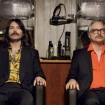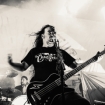Since their return to the stage in 2010, Michael Gira's Swans have (re)established their reputation for conjuring brutal ecstasy on stage. In this exclusive excerpt from Swans: Sacrifice And Transcendence—The Oral History, the first ever book on the band, Swans reach an intensity skirting close to the limits of what a human body can take ...
THOR HARRIS (Swans, 2010–17): Around 2013–14, we were the best touring band in the world—there was nothing like Swans. I would come off stage right at the brink of passing out from exhaustion. It felt like we were able to put in so much brute force and emotion.
MICHAEL GIRA: I have this nagging set of teeth chewing on the back of my head, constantly telling me, 'You could end up poor,' because I've gone hungry and I've been poor—I don't want that again. I don't want to end up covered in dust, carrying sacks of cement up stairs. I can't at my age—I'd collapse and have a heart attack. So there's constantly this force behind me.
JENNIFER GIRA: Michael as an energy—as a force—was one of the greatest things I'd ever seen. This was the last two gigs of that tour, so they were at the top of their game: the New York shows were the utter peak. It was the end of summer, and Michael is not a fan of air-conditioning, so it's literally 110 degrees, you could cut the air with a knife—it was like a sweat lodge. I see this man furiously playing—I seriously thought, 'This is insane, he's going to drop dead!' The crowd was roaring, and he played until he collapsed, basically. Maybe a year later, he admitted to me that he hadn't been in a good place, emotionally—that he'd been trying to die that night. I certainly saw it. They all looked like they were going to die.
BRANDON EGGLESTON (tour manager/live sound engineer): Everyone on stage was dying. Chris, Thor, and Phil all told me that multiple times they felt as if they were going to pass out. The show is so physically demanding on them all. They all lose so much sweat, they're drenched. It was brutal. Michael had this thing, 'We don't turn the air conditioner on for anything.' He said the air conditioner messed with his voice. There were rumours though that Michael used to do this in the early days, that he'd say, 'No air-conditioning. I want people suffering. I want them to feel the heat, the sweat—it's part of the experience.' It's an important show, and it's sold out; their gear is failing; Chris's bass amps fail; Michael and Thor are arguing; and the crowd is loving every second of it! Michael blew his amps up so, in the middle of the show, we had to take an intermission. In one song, Michael and Thor are playing, and Michael just turns around and yells, 'Stop that!' It's meant to be this emotive part of the song, everyone is drenched in reverb, and the drama in the room is really high—and Thor just says, 'OK,' and throws his melodica down on the vibraphone, then they start yelling at each other.
KRISTOF HAHN (Swans, 2010–17): For us, the experience is so intense that it's really hard to remember anything. That's how it is with Swans: if you start thinking, you lose it. Michael notices immediately. He wants to get lost himself. It's something inside that changes if there are some cracks in the lacquer. He realises that and he doesn't feel comfortable. It's all so loud it's not that he hears everything, but he hears that things aren't there. You have to be on your toes to supply that lacquer he's surfing on.
CHRIS PRAVDICA (Swans, 2010–17): You can tell by his body language what Michael wants. It's so loud on stage, he'd be screaming and I'd not be able to hear what he wanted because it's so loud. When he starts waggling his tongue that means 'more frenetic'—no more staccato, do freak-out stuff. He'll do little body-jerks when he wants you to add another beat in or he'll do a body-stop when he wants you to stop on the beat instead of playing the beat. He has all these cues, he cues me with his eyebrows!
PHIL PULEO (Swans, 2010–17): Sometimes a little grimace on your face is all it takes for Michael to feel that you've given more. Michael always wants something to look different or sound different, to bring it to a point where we're all in the moment and giving it everything we've got. If he was just sitting there smoking a cigarette and saying, 'I want more!' we'd say fuck it, but he's giving it everything. He's in it with us, in the trenches.
BRANDON EGGLESTON: One moment stuck out for me, where Michael had put his guitar down and was doing a song where he was dancing and vocalising, but he leaned over to Chris and put his hand on Chris's shoulder. They were both suffering in this horrible state, and Michael put his hand on Chris, put his head down. It was like, 'I'm with you, I know this is horrible, but we have to keep going. I will do whatever it takes to make this happen.' Solidarity and brotherhood to the max. We were doing two nights and the promoter found me and said, 'This is unsafe, we can't do the show tomorrow without air-conditioning.' I go to the stage and Thor grabs me: 'You have to have the air-conditioning on!' I take another few steps and Chris Pravdica runs up: 'We have to turn the air-conditioning on!' Sure enough, Michael stopped me later that night and asked, 'Did you tell them not to turn the air conditioner on?' I confirmed I'd done as he asked. He said, 'Good. Keep it up.'
MICHAEL GIRA: When I feel a gig has worked is when it's peaked—when, even just for an instant, you forget who you are and where you are and you're just inside this sound. To get there is no easy thing, but it's the entire goal, even with quieter songs, to be entirely subsumed in the music and unified with the sound.
This is an edited excerpt from Swans: Sacrifice And Transcendence—The Oral History by Nick Soulsby, published by Jawbone Press on June 26 and available for pre-order now.









